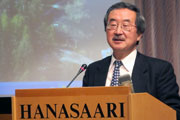UN official pays tribute to legacy of former Secretary-General Dag Hammarskjöld

Kiyo Akasaka, Under-Secretary-General for Communications and Public Information, told a forum in Espoo, Finland, dedicated to discussing the legacy of Mr. Hammarskjöld that the values he expressed when UN chief “remain unchallengeable” now, despite the enormous global changes of the past 50 years.
“Moreover, the conscience that he inspired in the United Nations – of active service in the common interest – is now manifested in many of its greatest undertakings,” Mr. Akasaka told the Hanaforum, citing “the embrace of human rights, the fight against impunity, the spread of democratic principles, the preservation of our global commons” and the battle to attain the Millennium Development Goals (MDGs) by their target date of 2015.
“This conscience is living and breathing. We see it most dramatically in the revolutionary changes taking place in the Middle East and North Africa.”
Mr. Hammarskjöld was the second UN Secretary-General, serving from April 1953 until September 1961, when he was killed in a plane crash while trying to resolve a crisis in what is now the Democratic Republic of the Congo (DRC). He was awarded the Nobel Peace Prize later that year.

USG Kiyo Akasaka addresses Hanaforum in commemoration of Dag Hammarskjöld
Mr. Akasaka said Mr. Hammarskjöld still inspired UN staff today with his view that our “fate is what we make of it,” but he added that for the world body to remain strong and to continue to make a difference, its 192 Member States need to demonstrate their active support.
“It will continue to require that governments give priority to the general global good rather than to specific national interests. This is not an abstract statement. Member States and governments are composed of individuals – men and women – whose vision and compassion create the institutions and spirit that animates the United Nations. The United Nations is us. And the values that unite us must continue to be the ones that motivate the United Nations.”
